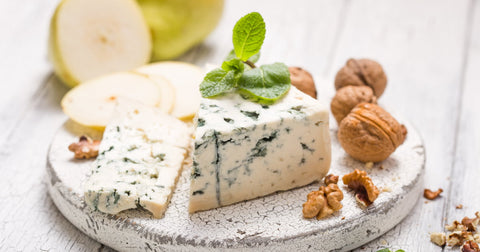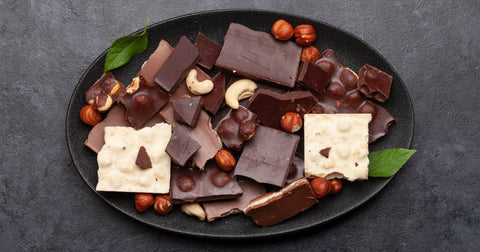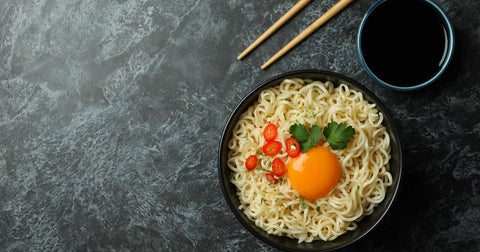Blue cheese, with its pungent aroma and tangy flavor, is a culinary adventure for many. But its distinctive appearance, marked by blue or green veins, often prompts the question: Is blue cheese mold?

This article explores the fascinating world of blue cheese, clarifying its nature, nutritional profile, potential benefits and risks, and addressing concerns about food intolerances.
Is Blue Cheese Mold? The Controlled Growth of Flavor
Yes, blue cheese is indeed made with mold. However, it's not the same kind of mold that grows on spoiled food.
-
Specific Mold Cultures: Blue cheese is produced using specific strains of Penicillium mold, carefully selected for their flavor-enhancing and safe properties. These molds are introduced during the cheesemaking process and are essential for creating the cheese's unique taste and texture.
-
Controlled Environment: The growth of these molds is carefully controlled in a specific environment, ensuring the cheese is safe to eat.
What is Blue Cheese? A Dairy Delicacy
What is blue cheese? It's a type of cheese made from cow's, sheep's, or goat's milk and characterized by its blue-green veins of mold. These veins are formed by the Penicillium mold cultures, which break down proteins and fats during the aging process.
Types of Blue Cheese: A World of Flavors
The world of blue cheese offers a diverse range of flavors and textures, depending on the type of milk used, the specific Penicillium strain, and the aging process. Some popular types of blue cheese include:

-
Gorgonzola: A creamy Italian blue cheese.
-
Stilton: A crumbly English blue cheese.
-
Roquefort: A tangy French blue cheese made from sheep's milk.
Is Blue Cheese Safe to Eat? Addressing Concerns
Is blue cheese safe to eat? Yes, blue cheese is safe for consumption. The Penicillium molds used in its production are different from the harmful molds that grow on spoiled food. They are carefully selected and controlled to create a safe and delicious product.
Blue Cheese Nutrition: A Detailed Breakdown
Blue cheese nutrition varies slightly depending on the type of cheese, but it generally provides:
-
Calories: Moderate to high.
-
Fat: Mostly saturated fat.
-
Protein: Good source.
-
Sodium: High.
Food Intolerance and Blue Cheese: A Potential Issue
While blue cheese is safe for most people, some individuals may experience digestive issues or other symptoms after consuming it. This could be due to:
-
Lactose Intolerance: Blue cheese contains lactose, although often less than other cheeses.
-
Histamine Intolerance: Blue cheese is a fermented food, and some people are sensitive to histamine.
-
Food Sensitivity: You might have a sensitivity to other components in blue cheese.
Food Sensitivity Test Kit: Uncover Your Digestive Triggers
If you experience persistent digestive discomfort or other symptoms after consuming blue cheese or other foods, a food sensitivity test kit can help identify potential triggers. By understanding your sensitivities, you can make informed dietary choices and improve your overall well-being.

Key Takeaways:
-
Blue cheese is made with specific Penicillium molds and is safe to eat.
-
It offers nutritional benefits but is high in saturated fat and sodium.
-
Food intolerances can occur, and a food sensitivity test can help identify triggers.
Disclaimer: This article is for informational purposes only and does not replace professional medical advice. Consult a healthcare provider for any health concerns.
Frequently Asked Questions:
1. Can I eat blue cheese if I'm pregnant?
It's generally recommended to avoid soft, unpasteurized cheeses during pregnancy due to the risk of Listeria bacteria. Some blue cheeses are pasteurized, but it's crucial to check the label and consult your doctor for personalized advice.
2. Is blue cheese high in sodium?
Yes, blue cheese is generally high in sodium. If you're watching your sodium intake, it's best to consume blue cheese in moderation or choose lower-sodium varieties if available.
3. Does blue cheese have any health benefits?
Blue cheese provides calcium, which is essential for bone health, and protein, necessary for building and repairing tissues. However, its high saturated fat content should be considered.
4. I'm allergic to penicillin. Can I eat blue cheese?
While the Penicillium molds used in blue cheese are different from the penicillin antibiotic, some people with a penicillin allergy might experience cross-reactivity. It's best to consult your doctor or allergist before consuming blue cheese if you have a penicillin allergy.
5. I experience digestive issues after eating blue cheese. Could it be a food intolerance?
Yes, it's possible to have a sensitivity or intolerance to components in blue cheese, such as lactose or certain proteins. If you experience symptoms like bloating, gas, or diarrhea, a food sensitivity test can help identify potential triggers.


.png?v=1737390083)
.png?v=1737187409)


